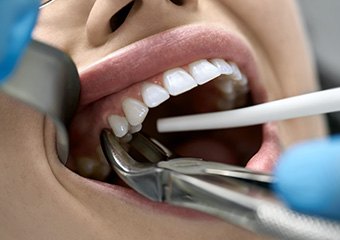Root Canal Therapy – Columbia, TN
Saving Your Teeth from Infection

If you have a toothache, Dr. Goodman may recommend having root canal therapy performed. Despite its reputation, this treatment is nowhere near as painful as many people believe, and it’s often your only option for saving an infected tooth from extraction. If you think you need a root canal, call our office right away; our team will use the latest techniques and technology to keep you as comfortable as possible during the procedure.
Do I Need Root Canal Therapy?

Root canal therapy is intended to treat severely damaged, decayed, or infected teeth. The only way to know for sure if the procedure is necessary is to have a dentist examine your tooth. That said, several symptoms could point to a dental issue that might require root canal therapy:
- Severe tooth pain that does not go away on its own after 24 hours.
- One specific tooth being sensitive to hot or cold temperatures.
- Discomfort whenever you bite or chew.
- Swollen, red gum tissue around the affected tooth.
- A pimple-like bump on the gums.
Any one of these symptoms on their own is cause for concern; if you notice any of them, call our office right away. Our team will schedule an emergency appointment for you (ideally on the same day as your call) so that we can identify the source of your pain and determine whether or not a root canal is needed.
The Root Canal Process

First of all, your mouth will be numbed to help keep you comfortable during your procedure. If you’re anxious or afraid, we may recommend using some form of dental sedation to ensure that you remain calm while we’re working on your smile.
Once the treatment begins, we’ll make a small hole in your enamel so that we can access the pulp. After removing the infected tissue, we’ll thoroughly clean the inside of the tooth to make sure there aren’t any harmful bacteria remaining. After filling the space with a biocompatible material, the remaining step is to place a crown. Said crown can be made out of lifelike materials that blend in with the rest of the smile so that most people won’t be able to tell that you had dental work done.
The Benefits of Root Canal Therapy

Root canal therapy is nowhere near as frightening as its reputation suggests. In fact, the procedure has many important benefits for your smile:
- It allows you to preserve your natural smile. An infected tooth that goes untreated will eventually need to be extracted. However, with root canal therapy, we can stop the infection before it grows too severe, allowing you to keep the tooth while protecting your overall oral health.
- It puts a stop to your pain. The bacteria causing the infection as well as the damaged parts of the pulp will be removed, allowing you to eat, speak, and smile comfortably again.
- It’s virtually painless thanks to modern techniques. Because we numb your mouth at the beginning of the procedure, root canal therapy is typically no more uncomfortable than having a filling placed.
Understanding the Cost of Root Canals

While you may need a root canal, you should still learn the procedure price first. How else will you know whether treatment is affordable? Having said that, the cost of root canals varies; you’ll need to see Dr. Goodman for an exact estimate. Our team will also work to make care budget-friendly, guiding you through key price factors, dental insurance, etc. Please keep reading or call us directly for further details!
Factors That Can Affect Root Canal Cost

Dr. Goodman must see your infected tooth before he confirms the cost of your root canal. Once he does, he can assess factors that affect your treatment’s price. These include:
- Tooth Type/Location – A root canal’s price is partly based on which tooth needs it. Some teeth have more roots than others, so treating one can cost more or less.
- Root Canal Complexity – A root canal will get expensive as it becomes more complex. Meanwhile, a simple one won’t cost much.
- Extra Dental Services – You may need a dental crown or filling after your root canal. In that case, the cost of your overall treatment will rise.
Is it Cheaper to Pull My Tooth?

Despite its low upfront price, a tooth extraction is less cost-effective than a root canal over time. The latter treatment saves you more money in the long run.
You see, tooth loss – regardless of cause – has harsh side effects. Leaving it unchecked leads to “smile gaps” that alter your bite and tilt your other teeth. Worse, those spaces let harmful bacteria breed and make tooth decay and gum disease likely. Filling the gaps can also be expensive and strain your overall budget.
The good news is that root canals lack such effects. By getting one, you’d save your tooth and prevent more costly complications. That means you should opt for treatment before an extraction becomes necessary!
Does Dental Insurance Cover Root Canal Treatment?

As it turns out, dental insurance usually covers root canals. Most plans see them as major procedures, often covering 50-80% of the cost. You’ll just want to confirm your policy’s benefits before committing to anything; they may differ from the average. If you’d like, our team can even help you contact your insurance provider. All you need to do is ask, and we’ll gladly assist!
Other Options for Making Root Canal Treatment Affordable

With or without insurance, a root canal can still be affordable. You can just rely on Goodman Family Dentistry’s helpful payment options! With the right one, your treatment can fit your budget easily.
For example, you may want to look into our flexible financing program. We take great pride in working with CareCredit – a reputable 3rd party lender. With their help, you could pay for a root canal in small monthly payments with little or no interest.
Rather than “break the bank,” you can get an affordable root canal for your tooth. Just visit us soon to learn how to finance your treatment!
Root Canal FAQs
How Long Does it Take to Recover from a Root Canal?
The recovery period depends on a few factors, including how many teeth were treated. That said, patients typically return to work or school the following day. If you want a little more time, consider scheduling your appointment on a Friday afternoon so you can rest on Saturday and Sunday!
What Should I Do Before a Root Canal?
Since soreness and sensitivity are normal following a root canal, it’s best to stock up on everything you need prior to your appointment. That includes soft foods, cold compresses, and OTC pain medication. There are also a few things you should NOT do, like smoking or drinking alcohol. Instead, focus on getting plenty of rest the night before, and pick something comfortable to wear the morning of your root canal.
Can I Take Antibiotics Instead of Getting a Root Canal?
No, antibiotics are not a suitable alternative to a root canal. The reason for this is that the medication cannot reach the pulp of the tooth, which is where the infection lies. So, the only way to eliminate it and restore the look, health, and function of your smile is to intervene with a root canal (or extract the tooth and replace it with a dental bridge or implant).
What Happens if You Wait Too Long for a Root Canal?
Simply put, the longer you wait, the more time the root of the problem has to progress. In fact, the damage may get so severe that saving your tooth is no longer an option. We want to intervene with the necessary care before that happens!
If you are considering putting off your appointment because you struggle with dental-related anxiety, then ask us about nitrous oxide! This mild form of dental sedation is suitable for a wide range of patients, and it can alleviate stress, worry, and nerves, allowing you to relax in the treatment chair while we work to restore your tooth.
We’d also be happy to address any other concerns or questions you have about your treatment plan, so don’t hesitate to reach out to a friendly member of our Columbia dental team!
Can Root Canals Be Prevented?
Actually, yes! In many cases, root canals can be prevented with good oral hygiene habits, like brushing for two full minutes with a soft-bristled toothbrush and fluoridated toothpaste each morning and night. Of course, you need to incorporate other best practices into your routine as well, like coming to our office every six months for a dental checkup and wearing a mouthguard during sports. That way, small cavities are treated right away, and your risk of sustaining chips, cracks, and fractures is significantly lower.
Are Root Canals Painful?
Of course, this list of FAQs wouldn’t be complete without this question – it’s one that nearly every patient asks! Fortunately, the answer is “No, root canals do not hurt.” That’s because your mouth is thoroughly numbed before the procedure, ensuring you don’t feel any pain or discomfort. Sedation dentistry also helps patients who have sensitive gag reflexes or experience head/neck/jaw pain in the treatment chair, making the process even more comfortable.
